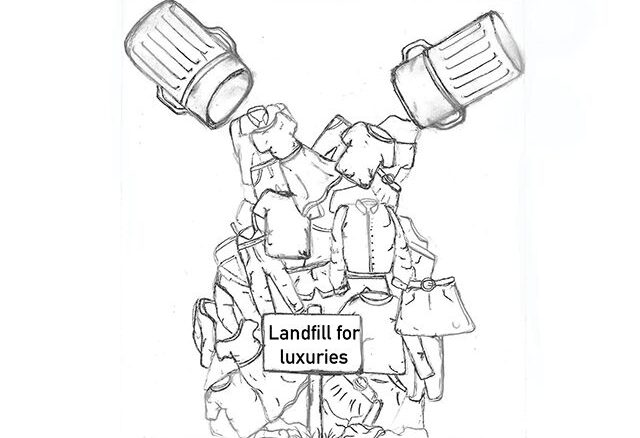
[dropcap]T[/dropcap]he fashion industry is one so massive, that the extent of its effects are difficult to comprehend. Especially in countries like Ireland, buying from the fashion industry is a pillar of everyday life.
On average every year, the Irish public spend €2.5m on clothing, according to Fashion Statistics Ireland.
When we have a big upcoming event, such as a wedding, we naturally go and buy a new suit or dress. At Christmas we buy clothes as presents, when we go on holidays we stock up on a new wardrobe for the heat.
The fast fashion industry and buying from it goes hand and hand with the marking of important events. Through it we can afford to buy masses of cheap clothes easily and as regularly as we do.
However, with 35 per cent of materials in the supply chain of this industry ending up as waste before they even reach the customers, fast fashion is taking a toll on our environment.
Three fifths of all clothing items end up incinerated or in a landfill within a year of being produced according to a 2016 Mckinsey report, and in the years since the fashion industry has grown in size and value. This is a result of the mass purchasing of cheap items of clothing that are not intended for long term use.
We are beginning to see a trend towards ditching fast fashion and shopping more sustainably with swap shops and sustainably created clothing becoming more fashionable especially among the Irish student population.
An example being the UK clothing company, BATOKO who produce swimwear made 100% from recycled plastic and have so far, recycled the equivalent of 220,000 plastic water bottles into swimwear to date.
Secretary of DCU’s Sustainable Living Society Ríonach Hurley told The College View she is opposed to the fast fashion industry.
“The fast fashion industry coerces us into thinking that we have to have the latest “on trend” clothes to be worthy,” she said.
“It’s important to me to shop sustainably because I can’t have the suffering of others and the environment on my conscience every time I buy an item of clothing.”
Hurley said she encourages students to “find the fun in sustainable fashion”.
She said most universities have eco societies that “organise really fun events like swap shops or charity shop crawls.”
Hurley believes that there needs to be a “societal change” in our attitude to clothing if any real shift is to happen.
It needs to “become socially acceptable again to wear the same clothes again and again.”
Reports of the conditions factory workers of the fast fashion industry face have also spiked concern.
According to the Human Rights Watch, World Report 2018, “factory owners and managers often fire pregnant workers or deny maternity leave; retaliate against workers who join or form unions; force workers to do overtime work or risk losing their job; and turn a blind eye when male managers or workers sexually harass female workers.”
The report also claims that such factories often have structural and fire safety issues, leaving to mass fires and collapses.
The collapse of the Rana Plaza garment factories in Bangladesh in 2013 killed over 1,000 people and brought global attention to the hazardous conditions and treatment of the factory workers.
For Evoke entertainment editor and RTE radio presenter Fionnula Moran, learning of these conditions forced her to switch to sustainable fashion.
Her decision to ditch fast fashion was “an overnight switch” after she watched the documentary “The True Cost” , a 2015 documentary giving insight into the lives of the people who work in large scale clothing factories, like the Rana Plaza one.
According to “The True Cost”, there are roughly 40 million garment workers in the world, “many of whom do not share the same rights or protections that many people in the West do.”
“I just thought it was absolutely horrendous, I’d never questioned it before, how we can go out and buy our outfits for like ten or 15 quid or whatever…have them be made out of crappy material and than just get something else for a new night out.”
Moran said “your money is so powerful and the way you spend it tells businesses what you stand for and what you won’t.” Referencing the lack of fair wages, clean and safe work conditions and workers rights in countries like Bangladesh.
“My personal style isn’t worth someone else’s life,” she said.
Moran often promotes sustainability on her own social media, and showcases sustainable shops,charity shops and swap shops that she recommends to her followers.
Moran inflicted a six month buying ban on herself in an attempt to “consume way way less.”
After these six months, Moran found herself “feeling the need to shop way less and just being content with what I own”.
However some people have said that shopping sustainably simply isn’t as easy as it seems. One Twitter user “@CovenOfRollies” said: “I’m starting a new job in a few days. I will be going to Penneys to buy some new work attire before I start…I cannot afford to go elsewhere. I refuse to feel bad about it, because it’s out of my control.”
Green Party TD Saoirse McHugh has recently been voicing her opinion on fast fashion in Ireland.
She told The College View, that she thinks the “government will have to intervene.”
“It has to do with the intentionally disposable nature of fashion nowadays. The high street now has up to 50 micro seasons of fashion and unsold clothing is mostly incinerated to keep the price up.”
“I would love to see Ireland leading on something like a global minimum wage. Legislation that would force companies to be transparent about how much the clothes producers are earning would be great too.”
McHugh said she wonders what would happen if it were made illegal to dump or incinerate unsold clothing.
However, she agreed that “we as a country are slowly becoming more aware. There are several influencers trying to highlight the issue and I think people are looking more and more at what they are wearing.”
Róisín Phelan
Image Credit: Trudy Feenane



